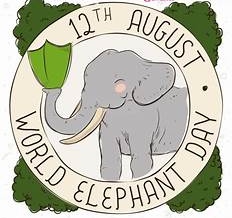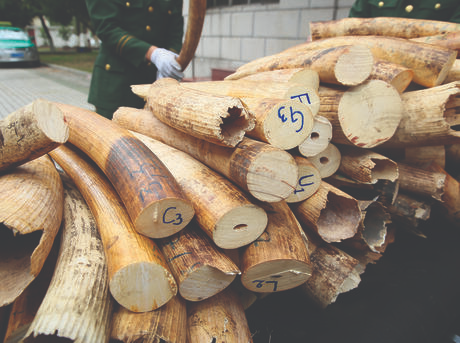World Elephant Day
World Elephant Day is a rallying call for people to support organizations that are working to stop the illegal poaching and trade of elephant ivory and other wildlife products, protect wild elephant habitat, and provide sanctuaries and alternative habitats for domestic elephants to live freely.
The goal of World Elephant Day is to create awareness of the urgent plight of African and Asian elephants, and to share knowledge and positive solutions for the better care and management of captive and wild elephants.
Each year, at least 20,000 African elephants are illegally killed for their tusks. A decade-long resurgence in demand for elephant ivory, particularly in parts of Asia, has fueled this rampant poaching epidemic. The elephant ivory trade threatens the very survival of this iconic species and causes broader ecological consequences.
In 1986, India amended the Wild Life (Protection) Act,1972 to ban even domestic sales of ivory.
The United States implemented a near-total ban on elephant ivory trade in 2016, and the United Kingdom, Singapore, Hong Kong, and other elephant ivory markets followed suit. Most significantly, China took the remarkable step of closing its legal domestic ivory market at the end of 2017.
Enforcement agencies have yet to determine the proportion of animals which were poached, and those who died of natural causes, but it has been established that most of the tusks are from elephants poached in Botswana.
Under federal law, new ivory cannot be imported, exported or sold across state lines.
Antique ivory can be sold with proper documentation proving that the item is an antique that is at least 100 years old.
People have been known to use ivory to bribe government officials, because it is rarer than money or gold. Some seek out elephant ivory products for spiritual reasons, believing a bangle or pendant can protect its wearer from harm or bad luck.
There is an entirely separate and legal trade of walrus ivory, which is culturally and economically important to Indigenous communities in the Arctic. The sustainable use and sale of walrus ivory by Alaska Native peoples has not had the same negative impacts caused by the illegal trade of elephant ivory.
- ИЗБРАННОЕ
- ИССЛЕДОВАТЬ
- Страницы
- Группы
- Мероприятия
- Статьи пользователей
- Rewards
World Elephant Day
Сообщение 2024-08-10 07:46:02

Most Recent
Top Comments
Record
Recording 00:00
Комментарии были отключены для этого поста.
- Shivansh👍👍
- Нравится
- Ответить
- 2024-12-02 05:45:48
-
Категории
- Sustainability
- Главная
- Wellness
- Theater
- Sports
- Shopping
- Religion
- Party
- Другое
- Networking
- Music
- Literature
- Art
- Health
- Gardening
- Игры
- Food
- Fitness
- Film
- Drinks
- Dance
- Crafts
- Causes
Больше
About the dog🐕🐕🐕🐕🐕
Dogs, known as "man's best friend," are beloved companions renowned for their loyalty, playful...
Dance Day 🩰
International Dance Day, also known as World Dance Day is celebrated every year on 29 April. This...
Road Safety Rules
For Drivers: Follow traffic rules, wear seatbelts, avoid distractions.
For Pedestrians: Use...
The Importance of Incident Response Plans
An incident response plan (IRP) is a crucial component of an organization's cybersecurity...
USING MANURE IS GOOD FOR SOIL OR BAD?
When crops are grown one after the other, it decreases the productivity of the soil. However,...
×
Your daily access limit has been reached. Please try again tomorrow.
© 2025 GoSharpener Pvt.Ltd.
Refund and Cancellation policy - We do not entertain any refunds and cancellation Russian
Refund and Cancellation policy - We do not entertain any refunds and cancellation Russian

